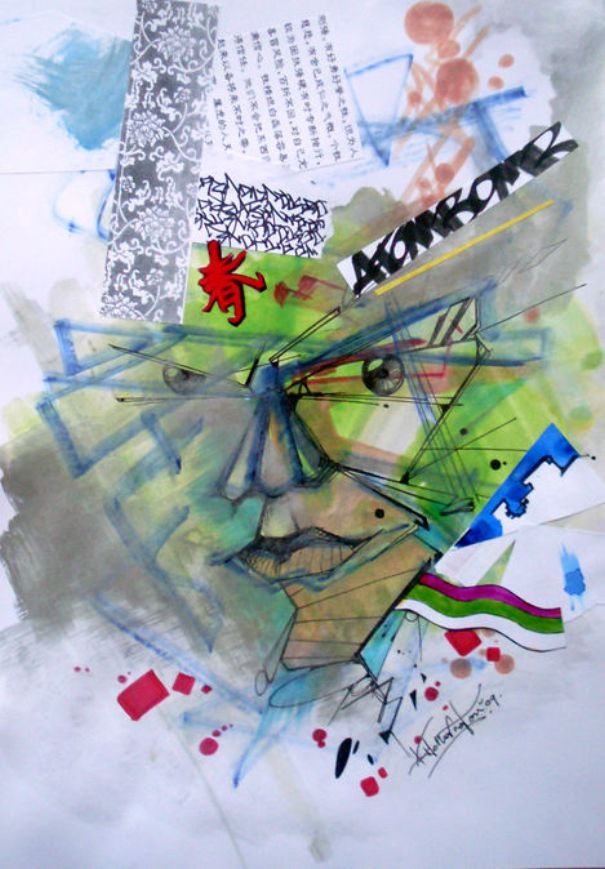Miss Part 1? Click here to go back and read Part 1 of Nicole Tanquary’s novella Rabbitheart
The silence was what woke me up.
I had gotten used to sleeping with my thirty-or-so roommates over the years. A lot of them snored. Almost all of them tossed and turned, trying to find a comfortable spot on their mattresses (me included) … but even if every other noise was taken away, you could still hear thirty mouths breathing in, breathing out, filling the shack with warm, heavy air. Sometimes I thought I could even hear their hearts beating.
I blinked my eyes, disoriented. For a moment I thought that someone had stuffed poison into our room, and every women besides me had breathed it in and died – I couldn’t hear anyone, not even the snorers. Even more surprising was that there was no Gut standing over my head, banging on his piece of metal loud enough to raise the dead. No Gut yelling that we were behind in our quota. No Gut getting us out of bed for another day of work. So why had I woken?
“Gut?” I mumbled. I tried raising a hand to scrub at my eyes, but found that I couldn’t. They had been tied together with some heavy, greenish rope.
Then I remembered the blue eyes in the bush. The run. The cliff …
“So. You’re awake.” I rolled over to find the vie … the not-vie, I corrected myself, remembering the words that had been said just before I blacked out … sitting cross-legged in front of a yellow tree. The tree’s branches stretched above us to make a sort of makeshift ceiling. Curtains of shimmery green leaves hung off to my left, like the walls of a room. We were alone.
I dug my fingers into the loam beneath me, staring at the not-vie, not daring to blink. He had cleaned himself up while I was unconscious. He had changed his clothing, and his blue-black hair was combed and tied back. I felt a fierce pleasure when I saw that bandages had been wrapped around where I had bitten him. “It still hurts, you know,” he said, noticing my gaze. “You kept at it, even when I said we weren’t going to hurt you. The vie just want to ask you some questions, about the Ventine you’ve stolen. That’s all. So how come you bit me?”
My lip curled back in a silent snarl. He didn’t move, but stared coolly back, his head tilted to one side. I got the sense that he was studying me, in the same way I had been studying him.
Then I finally noticed Spiderhands. He lay on the ground a foot away from me, curled on his side. His wrists were bound, like mine, his long, stretched fingers balled into fists on the grass. I could see a spot of blood on his temple.
Finding my ankles unbound, I crawled to him and examined the spot. It looked as if something heavy had hit him. “Spiderhands, what happened? You were going to get away,” I whispered. Then I turned on the not-vie. “What did you do to him?” I spat.
“Calm down. He’s not dead,” said the not-vie, who’s name, I finally remembered, was Tan. He brushed blue-black hair out of his eyes. “When we got you under control, he came crawling back up the cliff, to save you, I guess. We didn’t know he was there; we figured he had fallen all the way down. Anyways, he grabbed my ankle and pulled me over the edge. You thieves are stronger than you look, as it turns out. Luckily, being what I am, I didn’t get hurt in the fall. Though I’m thinking you would’ve liked to have seen me die.” Tan smiled, and a shrug rolled through his shoulders. “The others didn’t like that I was attacked, of course. They got a hold of him and punched him out … poor guy. He’s gonna have one hell of a headache when he wakes up.”
“I’ll give you a frickin’ headache,” I shouted, and pushed myself to my feet. In an instant an arm was around my neck, in the same hold Tan had used on me. Except, this arm was much larger. I was forced to stand on my tiptoes to avoid hanging myself. A guard? I wondered.
Tan heaved himself up. “I know the vie have been anxious to go ahead with the interrogation. Since one of the thieves is awake, I think we can start. The other one will wake up eventually, right? And you,” he said, addressing me directly now. “It’d be a real hassle to have to carry you all the way to the meeting chamber. I’d rather you walk yourself there. So I don’t really want to have to tie your ankles together. However, if I need to, I will. Understand?”
The not-vie guard who had grabbed me eased off my windpipe, but didn’t take his arm away until I gasped out, “Fine.” Tan nodded his approval. Then he moved to where the unconscious Spiderhands lay and, in a fluent motion, slung him over one shoulder.
Fingers like sausages clapped down on my own shoulders, and began to steer me in the direction of the leaf curtain wall. A moment later I was pushed through.

 I was one of three foremen who ran the Purifier for the General Secretary before and during the upheaval. Those were dark days for all of us, and anyone who can sit in a rocking chair by the fire, warming his fingers and talking about those times, is lucky. Lucky to be alive, lucky to have his fingers still, lucky to have his tongue. But not everything about those times was evil. Like all times, in all places, I suppose, some bits of light make life worth living, grim as things might get.
I was one of three foremen who ran the Purifier for the General Secretary before and during the upheaval. Those were dark days for all of us, and anyone who can sit in a rocking chair by the fire, warming his fingers and talking about those times, is lucky. Lucky to be alive, lucky to have his fingers still, lucky to have his tongue. But not everything about those times was evil. Like all times, in all places, I suppose, some bits of light make life worth living, grim as things might get.